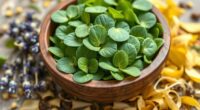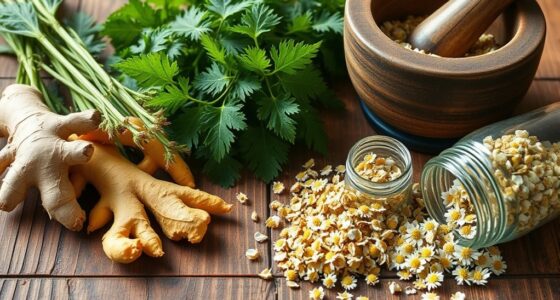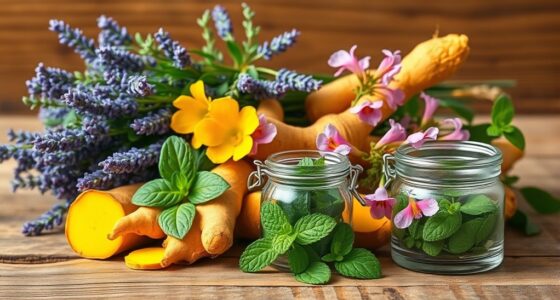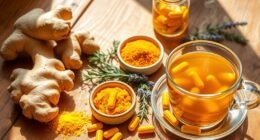To soak away pain, try a warm herbal bath with soothing essential oils like lavender, eucalyptus, or peppermint. Add herbal bath salts infused with chamomile, ginger, or rosemary to relax muscles, reduce inflammation, and soften skin. Customize your soak with your favorite herbs and scents for targeted relief and calming effects. Creating a relaxing environment with dim lights and gentle music enhances the experience. Keep exploring for more tips to maximize your muscle recovery.
Key Takeaways
- Use warm herbal baths infused with soothing herbs like chamomile or ginger to relax tense muscles and reduce inflammation.
- Incorporate essential oils such as lavender, eucalyptus, or peppermint for targeted relief and enhanced relaxation during soaks.
- Customize bath salts with ingredients like Epsom salts and herbal infusions to soothe soreness and promote detoxification.
- Create a calming environment with dim lighting and calming music to maximize the healing and relaxation benefits of the bath.
- Practice deep breathing during your soak to improve circulation, release toxins, and deepen muscle relaxation.
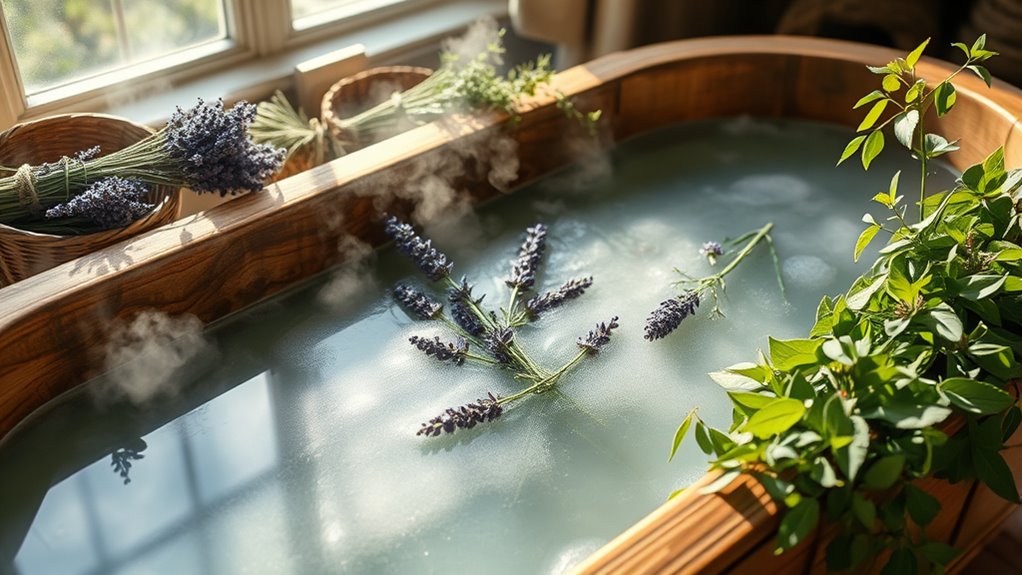
When muscles are sore and tense, a warm herbal bath can provide quick relief and relaxation. As you step into the tub, the soothing scent of carefully crafted aromatherapy blends surrounds you, helping to ease tightness and calm your mind. These blends, made from essential oils like lavender, eucalyptus, and peppermint, not only create a calming atmosphere but also target muscle discomfort directly. Incorporating aromatherapy into your bath enhances the overall experience, making relaxation more effective and enjoyable.
Herbal bath salts are an excellent addition to your soak, offering both therapeutic benefits and a luxurious feel. These salts, infused with herbs like chamomile, rosemary, or ginger, dissolve in warm water, releasing their properties to relax muscles and reduce inflammation. As you submerge yourself, the salts work to soften your skin while the herbal extracts penetrate deeply, easing knots and relieving soreness. The combination of warm water, salts, and herbs creates a potent remedy that can help you unwind after a strenuous day or an intense workout.
Herbal bath salts soften skin, relax muscles, and soothe soreness with calming botanicals and warm water.
To maximize the benefits, choose herbal bath salts that suit your specific needs. For instance, if you’re dealing with inflammation, salts infused with ginger or turmeric can be particularly helpful. If you’re seeking a calming experience, opt for blends that include lavender or chamomile. You can even mix your own herbal bath salts at home by combining Epsom salts with dried herbs and a few drops of your favorite essential oils. This personalized touch allows you to customize your soak for maximum relief.
Remember to set the scene for a truly restorative experience. Dim the lights, perhaps add some calming music, and breathe deeply as you soak. The warm water will increase circulation, helping to flush out toxins and bring fresh oxygen to tired muscles. The aromatherapy blends will lift your spirits and ease your mind, while the herbal salts work on your muscles, reducing stiffness and soreness. It’s a simple ritual that can turn your bathroom into a personal spa, offering both physical relief and mental calm.
Taking time for this kind of herbal bath treatment regularly can prevent muscle tension from building up and promote quicker recovery after physical activity. It’s an accessible, natural way to soothe soreness without relying on medications. Incorporating herbal bath salts and other natural remedies aligns with the principles of a holistic approach to health and wellness. With the right combination of aromatherapy blends and herbal bath salts, you’ll find yourself feeling renewed, relaxed, and ready to face whatever comes next. So next time your muscles are crying out for relief, remember that a warm herbal bath is just a soak away from comfort.
Frequently Asked Questions
Can Herbal Baths Help With Chronic Muscle Pain?
Herbal baths can help soothe chronic muscle pain by promoting relaxation and reducing inflammation. You should focus on effective herbal extraction techniques to maximize benefits, such as steeping herbs properly before the bath. When preparing your herbal bath, use calming ingredients like lavender or eucalyptus. Regular soaks may provide relief over time, making them a gentle, natural option to manage ongoing discomfort.
Are Herbal Bath Remedies Safe for Sensitive Skin?
Herbal bath remedies can be safe for sensitive skin if you pay attention to allergy concerns and herbal ingredient safety. You should patch-test new herbs before full immersion and choose gentle, soothing ingredients like chamomile or oatmeal. Always read labels carefully and avoid herbs known for causing irritation. If you experience redness or itching, rinse immediately and consult a dermatologist. With proper precautions, herbal baths can be a relaxing, safe way to soothe your skin.
How Often Should I Take an Herbal Muscle Soak?
Imagine your muscles as a garden needing gentle rain. You should follow the frequency guidelines, usually taking an herbal soak 2-3 times a week. Keep the herbal soak duration around 15-20 minutes to avoid overdoing it. Listen to your body—if your skin feels sensitive or irritated, extend the time between soaks. This balance helps soothe soreness without overwhelming your skin’s natural harmony.
Can Herbal Baths Reduce Muscle Inflammation Effectively?
Herbal baths can definitely help reduce muscle inflammation effectively. The herbal infusion in warm water soothes sore muscles and promotes circulation, aiding muscle recovery. When you soak, the herbs penetrate your skin, delivering anti-inflammatory benefits directly to affected areas. Regular herbal baths can support your body’s healing process, easing soreness and swelling, making them a natural and relaxing way to enhance recovery after intense activity.
Are There Any Herbal Bath Remedies for Joint Pain?
Imagine your joints as delicate gardens needing tender care. Herbal bath remedies, like soothing herbal tea benefits and calming aromatherapy blends, can act as gentle rain, easing joint pain. You can add herbs like turmeric or ginger to your bath for anti-inflammatory effects. Aromatherapy oils such as frankincense or lavender enhance relaxation, helping your joints feel less strained. These natural remedies nurture your body, restoring harmony and comfort.
Conclusion
So, next time your muscles scream for mercy, don’t bother with those fancy pills or costly massages. Just toss some herbs in your bath and pretend you’re a medieval healer. Because nothing says “I’ve got this” like soaking your pains away while secretly wondering if the herbs will turn you into a unicorn. Who knew relaxation could be so simple—and so utterly magical? Just remember, it’s all about the herbs, not the spa bill.


